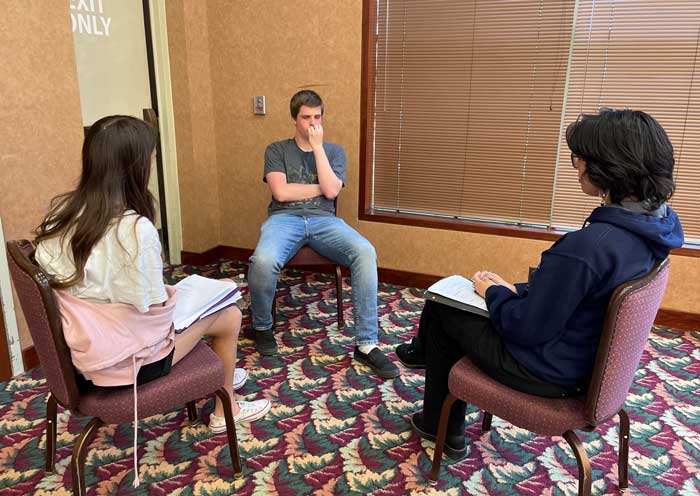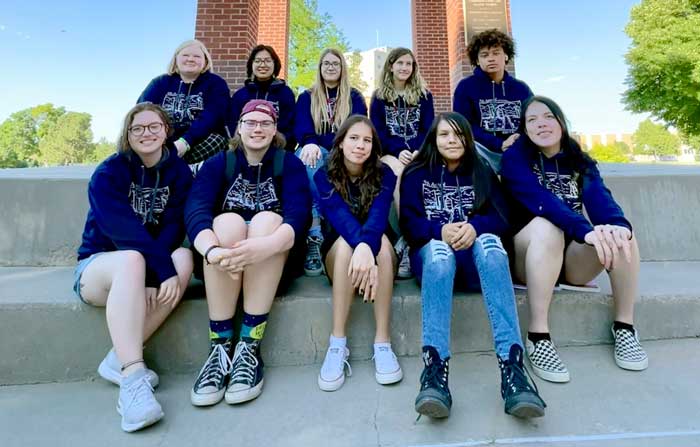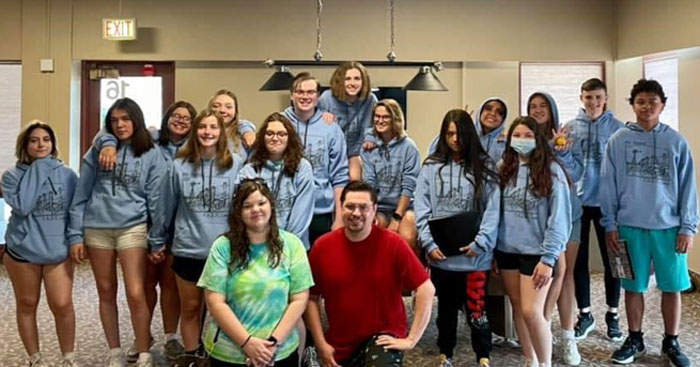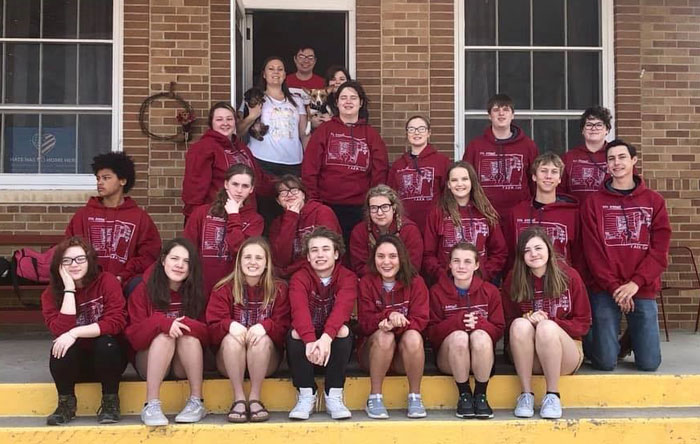Frontier Area Rural Mental Health Camp and Mentorship Program (FARM CAMP)
- Need: To reduce the shortage of behavioral health professionals in rural Nebraska.
- Intervention: A week-long camp teaches high school students in rural and tribal communities about different career options in behavioral health and provides mentorship after the camp ends.
- Results: In 2022, 10 high school students participated in the camp, and a former camper returned to present on their work in a psychology lab at the University of Nebraska-Lincoln.
Description
In Nebraska, 90 out of 93 counties are Health Professional Shortage Areas (HPSAs) in mental health, and one county is partially covered by shortage areas. One program has been working since 2013 to encourage local students to pursue a career in behavioral health and help reduce this shortage.
The Frontier Area Rural Mental Health Camp and Mentorship Program (FARM CAMP) is a free camp that encourages high school students to pursue careers as psychologists, social workers, substance use counselors, and other behavioral health occupations.
FARM CAMP has taken place in the rural communities of Rushville and Winnebago, which is on the Winnebago Indian Reservation. The program recruits Nebraska students as well as students from the Pine Ridge Reservation in South Dakota.
The program is partly funded by the Behavioral Health Education Center of Nebraska (BHECN).
Services offered
Rural high school students spend a week taking a college-credit class, which covers topics such as mental health, psychology, substance use disorders, and ethics. Students also learn more about their local/Native culture and ways to incorporate cultural competency into care. Behavioral health professionals educate the students on career options and share their experiences.
Theatre students from Chadron State College (CSC) or local high school drama programs act as patients so students can practice identifying and working with different behaviors.

For a final project, participants pair up and create a social media reel, digital poster, or podcast about a behavioral health topic. Participants present their work to the group, make final edits, and have their projects posted on Western Nebraska Behavioral Health's social media.
In past camps, the final project tasked participants with designing a community project to address a need that they saw in their own rural community. On the final day, students presented their projects to one another and obtained additional feedback and ideas. At the end of the Winnebago camp, students additionally met with the Tribal Council to pitch community improvement ideas.
FARM CAMP organizers also mentor these students and stay in touch after camp ends. Mentoring offers career counseling and overall support, especially to students struggling at home or in school.
Results
In 2022, 10 campers (5 new and 5 returning) from Alliance, Gordon, Pine Ridge, Rushville, and Valentine participated in the camp. Two junior members (middle school students) participated in part of the camp. One former camper returned to present on their work in a psychology lab at the University of Nebraska-Lincoln.
In 2021, a total of 15 students (7 returning alumni) from Alliance, Gordon, Pine Ridge, Rushville, and Valentine participated in the camp. No camp was held in 2020 due to COVID-19.

In 2019, 13 high school students from Broadwater, Chadron, Gordon, Rushville, and Sidney participated in the camp. Six alumni from earlier camps also returned to participate again and/or mentor new students.
In 2018, 8 high school students from Bridgeport, Chadron, Dodge, Howells, Rushville, Sidney, and Valentine attended the Rushville camp, with four FARM CAMP alumni returning. In 2017, 11 students attended the Rushville camp.
The Winnebago camp received the following numbers of students in past years:
- 2015 camp: 9 students
- 2016 camp: 7 students
- 2017 camp: 4 students
Challenges
Rural Nebraska is a large geographic area, so one challenge early on was reaching students. Simply sending out information to guidance counselors was not as effective as in-person presentations by staff. Word of mouth has been a very effective recruiting tool. Past participants tend to speak highly of the experience to younger students in their communities.
Another barrier is financial. It's important to run the camp at no cost to students, due to the high poverty levels of these rural communities. Costs associated with lodging, meals, college credit, supplies, and activities can be high for a week-long event. This barrier has been addressed through collaborative efforts with BHECN, CSC, and a number of community agencies that provide donations to support the camp.
Demands on staff time is another challenge, as staff typically work 12 to 14 hours each day of camp.

Replication
Run the first camp(s) with a local provider, and then turn it over to local staff. This is a useful strategy, as there is a sharp learning curve the first year. Local leadership is important to keep local investment high.
It's important for participants to build connections with one another as well as with staff mentors.

Contact Information
Catherine Jones-Hazledine, PhD, PsychologistWestern Nebraska Behavioral Health
FARM CAMP
308.327.2026
drcate@westernnebraskabehavioralhealth.com
Topics
American Indian or Alaska Native
Behavioral health
Behavioral health workforce
Health workforce pipeline
States served
Nebraska
Date added
July 19, 2018
Date updated or reviewed
September 20, 2022
Suggested citation: Rural Health Information Hub, 2022. Frontier Area Rural Mental Health Camp and Mentorship Program (FARM CAMP) [online]. Rural Health Information Hub. Available at: https://www.ruralhealthinfo.org/project-examples/1024 [Accessed 14 December 2024]
Please contact the models and innovations contact directly for the most complete and current information about this program. Summaries of models and innovations are provided by RHIhub for your convenience. The programs described are not endorsed by RHIhub or by the Federal Office of Rural Health Policy. Each rural community should consider whether a particular project or approach is a good match for their community’s needs and capacity. While it is sometimes possible to adapt program components to match your resources, keep in mind that changes to the program design may impact results.
